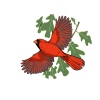Greetings Conococheague Auduboners and friends –
I think spring is coming after all. Saturday, February 28 was gorgeous and warm – what a treat! For me, best of all, a Pine Siskin popped in on Friday and was here yesterday as well. I hope you are seeing good birds in your yards, too.
Our last FREE nature film of this season will be shown at 7 PM, Thursday, March 5, at Chambersburg Area Middle School South (1151 E. McKinley St.). Come get tuned up for migration with “Watching Warblers”. Door prizes will be awarded following the film. Admission is free, but we happily accept donations at the door.
SOAR Bird Walks will take place on the first and third Saturdays (7 and 21 March).
Our next regular meeting takes place on March 9, Monday, at 7:00 PM. Gabriel Foley, executive director of the Maryland Bird Conservation Partnership, will present “Results of Recent MD and DC Breeding Bird Atlas”. Our regular meetings occur at St. Luke Evangelical Lutheran Church (off Route 997, near Scotland exit off I-81) 2695 Luther Dr, Chambersburg, PA 17202. Please join us in person or via Zoom. We welcome everyone.
The first planning session for the Beginning Birders’ Workshop (June 6) will occur before this meeting, so come at 6:30 to participate.
We’re already starting to plan for our next season. Please submit budget requests covering June 1, 2026 – May 31, 2027 to Donna Hocker no later than March 15, 2026.
Field trips coming up this month include:
- March 7, Saturday. 8:00 AM Middle Creek WMA, Lancaster County auto tour for WATERFOWL. Meet at the Park & Ride, Scotland Exit 20, I-81 northbound. Bring scopes, binoculars, and lunch. Eric and Rhetta Martin, 717-597-8675.
- March 19, Thursday. 7:15 PM Tentative outing for WOODCOCKS at Heisey Road orchard with Bob Keener. Head to 5207 Heisey Rd, Shippensburg but park 0.10 mile off of Stillhouse Hollow Rd. Bring flashlights. Bob Keener, 717-658-8765.
- March 28, Saturday. CONSERVATION CLEAN-UP. Adopt-A-Highway clean-up on 2 miles of Route 997 (Black Gap Road) west from I-81. Pick up trash on section with wide shoulders, easy walking. Supplies provided. Meet at 9:00 AM at Scotland Park & Ride, I-81 exit 20. Sign up with Joe & Vanessa Miller, 717-377-6507 (Joe), millerhouse@embarqmail.com.
Please contact the leader in advance and check our website for any last-minute updates. We have a change for one trip in May: Bill Oyler’s field trip in the Fort McCord area has been shifted to May 30.
We continue to seek volunteers for these positions: Film Chair and Vice President. Please contact me to offer your services. Elections will take place at our April 13 meeting, so we really need a candidate for Vice President soon!
Thanks to all who have made a donation. If you would like to, please send your check to Conococheague Audubon Society, PO Box 20, Fayetteville, PA 17222. Good birding!
